Alfa rides new Tonale into expanded U.S. presence
By John Gilbert
If you’re old enough, you might remember the 1967 movie “The Graduate,” in which a college-aged Dustin Hoffman, Anne Bancroft and the beautiful Katherine Ross became huge stars. But they had to share star billing with a captive 1996 Alfa Romeo Duetto Spider, the 2-seat roadster that carried Benjamin on his assorted escapades.
We all could identify with somebody in that classic coming-of-age movie, and we all were unanimous in wanting an Alfa Romeo.
There is a touch of magic that penetrates your soul when you drive an Alfa, although the Italian company never made it big in the U.S. except in the dreams of anybody who appreciates a fine precision driving machine that practically anticipates your driving impulses. That feeling came back in spades when Alfa created the Giulia sedan and, as a part of owner Fiat just after Chrysler Corporation joined it as a sibling, many new American drivers got a taste of that magic. Same with the following Stelvio, a midsize SUV that handled like a Giulia, which handles like a sports car.
But the overriding concern is that the sensational feeling of driving an Alfa might be offset by the reputation — accurately gained, we must add — of unreliability, when compared to the top German sports sedans.
For 2024, however, there has been an enormous changeover at Alfa Romeo, which now is under the Stellantis banner of ownership — as is Ferrari, Chrysler, Dodge, Ram, Jeep, Fiat, Maserati, Aston Martin, and Alfa Romeo. Under that umbrella, the Tonale is being introduced into the U.S., but not just with the usual new-car hope. Stellanis has pushed Alfa to improve the breed and make the Tonale a model that can come to the U.S. and make serious inroads into the American market.
Almost subtly, Alfa has risen in the JD Power new-car satisfaction and initial quality ratings that are the most trusted in the industry. When I learned that Alfa had risen to the top echelon in those two classifications — ahead of BMW, Mercedes and Audi — it was startling. If Alfa is more dependable and trustworthy than those three stellar marques, that is a dazzling hat trick. With that in its resume, we learn that Stellantis is directing Alfa to send enough Tonales to the U.S. to erase all those old barriers that prevented U.S. consumers from seeking out Alfa vehicles.
What has not been erased from Alfa’s resume is that magical driving experience. I was able to spend a week with a 2024 Tonale up and down the hills of Duluth, up and down the highways up the North Shore of Lake Superior. The steering and precise handling immediately conjured up reflections of the Giulia, which I found to be one of the best-handling sedans every built, right up there with the top BMW sports sedans.
And the luxury touches in the interior add to the image, while the technology is simply off the top of the charts. In this era of moving toward electrification, the Giulia makes a valid statement of taking hybrid technology to new levels of economy and performance, over and above normal gas-engined cars and without any of the range-anxiety that gives pause to car-buyers to adopt all-out electric vehicles.
When I first did a brief drive in various new models at the Midwest Auto Media Association’s spring rally at Road America, I was impressed with both Alfas I drove, but I was unaware of the intricacies of the engineering technology under the hood.
It starts with a surprisingly sprightly 1.3-liter 4-cylinder gas engine, turbocharged, and adds a 15.5 kilowatt-hour battery to power a 90 kilowatt electric motor. Altogether, the system produces 272 horsepower, running through all-wheel drive via a 6-speed automatic. There are various buttons and controls you can activate to stress regenerative braking power back to the battery-pack or to push the gas-engine power, or the joint power of the plug-in hybrid.
The base model is certainly no slouch, with a 2.0-liter 4-cylinder turbo engine and a 9-speed automatic with all-wheel drive, but its more-than-adequate power is left behind by the hybrid powertrain. The battery pack, incidentally, is an advanced-tech unit produced in China, which means its internationally flavored production is 56 percent from Italy (it’s assembled in Pamigliano, Italy), with the transmission from Japan, and the final 12 percent of Chinese origin. We in the U.S. are concerned about falling behind China’s onrushing advantages in battery and EV technology, but Italy is not suffering from the same reluctance.
A subtle little driving advantage is that the steering-wheel shift paddles, normally affixed to the steering wheel’s right and left edges, are tall alloy bars that are affixed to the steering column, instead, so in spirited driving, if you swerve around a sharp corner, you needn’t grope for where on the turned steering while to find those paddles — they’re where they always should be.
On the console and dash, you find different controls. One offers a tightening of the steering and suspension whether you select sport, eco or comfort, and another for whether you want to stress gas, hybrid or EV power. Similarly, you can change the entire format of the instruments, going digital or analog, or giving you speed in a large digital number and other information easily set. I personally prefer the familiar round analog tach and speedometer, with other pertinent information between them.
For all the technology loaded into the Tonale, I was surprised to learn that the vehicle could be obtained for about $45,000, although adding the $1,500 19-inch alloy wheels, a $1,200 full electric moonroof, a $3,000, a $2,000 premium sound package, and a $2,000 advanced active-assist package with various safety alerts and lane-changing devices boosted the test car’s sticker to $55,950.
Still, if JD Power is right, and the Tonale TI e is now higher rated than BMW, Mercedes, Audi and nearly all other worldwide vehicles in initial quality and satisfaction, plus you get high-tech power and fuel economy, and that legendary Alfa handling magic, well, the price is a bargain.


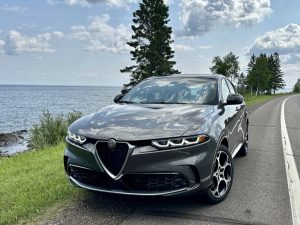
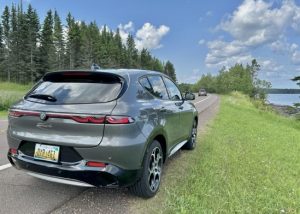
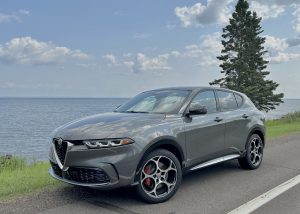
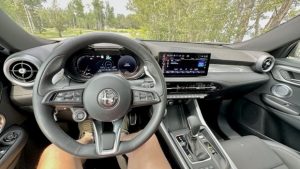
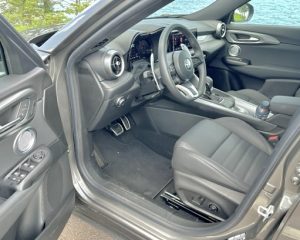
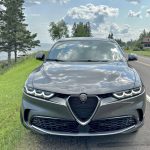
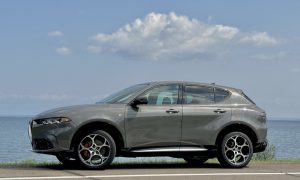
 John Gilbert is a lifetime Minnesotan and career journalist, specializing in cars and sports during and since spending 30 years at the Minneapolis Tribune, now the Star Tribune. More recently, he has continued translating the high-tech world of autos and sharing his passionate insights as a freelance writer/photographer/broadcaster. A member of the prestigious North American Car and Truck of the Year jury since 1993. John can be heard Monday-Friday from 9-11am on 610 KDAL(www.kdal610.com) on the "John Gilbert Show," and writes a column in the Duluth Reader.
John Gilbert is a lifetime Minnesotan and career journalist, specializing in cars and sports during and since spending 30 years at the Minneapolis Tribune, now the Star Tribune. More recently, he has continued translating the high-tech world of autos and sharing his passionate insights as a freelance writer/photographer/broadcaster. A member of the prestigious North American Car and Truck of the Year jury since 1993. John can be heard Monday-Friday from 9-11am on 610 KDAL(www.kdal610.com) on the "John Gilbert Show," and writes a column in the Duluth Reader.